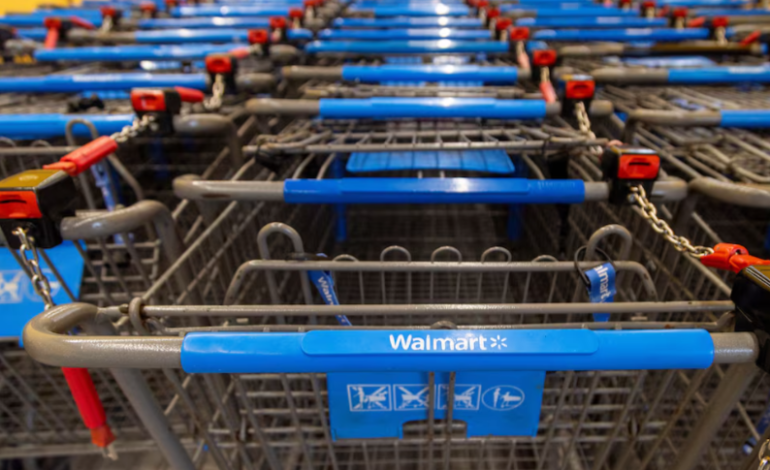Walmart, the world’s largest retailer, has announced that it will begin raising prices on select merchandise by the end of May, citing continued pressure from US tariffs as a key factor.
Executives issued the warning on May 15, following the company’s first-quarter earnings report, which exceeded profit expectations but reflected broader concerns about the economic impact of global trade tensions.
Chief Financial Officer John David Rainey told CNBC that while Walmart will absorb some of the increased costs, the company cannot avoid passing a portion of those expenses on to customers. Price hikes are expected to become more visible in June, as the retailer navigates what it called an “unprecedented” environment shaped by volatile tariffs and shifting trade policies.
Despite this, Walmart reported a stronger-than-expected performance for the quarter. US comparable sales rose 4.5%, beating analyst estimates of 3.94%, while adjusted earnings per share reached $0.61, surpassing forecasts of $0.58. Total net sales rose 2.5% to $165.6 billion, just under market expectations.
Walmart maintained its full-year earnings guidance, projecting adjusted earnings per share for fiscal 2026 between $2.50 and $2.60 and annual sales growth of 3% to 4%. However, the company did not issue a second-quarter profit forecast, citing ongoing uncertainty around the pace and extent of future tariff increases.
The company’s size and scale have historically enabled it to keep prices lower than competitors, but executives noted that even Walmart is feeling the strain. As the largest importer of container goods in the US, Walmart is particularly exposed to international trade policy. Although a recent agreement between the US and China temporarily reduced tariffs on some imports from 145% to 30%, Rainey emphasized that “tariffs are still too high.”
Walmart CEO Doug McMillon said on a call with analysts that the retailer is making efforts to minimize the impact of tariffs through supply chain adjustments. For example, it is working with suppliers to replace tariff-affected materials like aluminum with alternatives such as fiberglass. However, for certain imports—such as bananas, avocados, coffee, and roses from Costa Rica, Peru, and Colombia—price increases may be unavoidable.
About one-third of Walmart’s products sold in the US are made, grown, or assembled domestically, but the company also sources goods from countries including China, Mexico, Vietnam, India, and Canada. McMillon stressed that while general merchandise categories like toys and electronics will likely see price increases, Walmart aims to prevent higher tariffs from spilling over into food prices.
Beyond Walmart, other companies have also started raising prices in response to tariff pressures. Birkenstock, for example, announced global price increases to offset the cost of a 10% duty on European Union-made goods imported to the US.
Walmart’s scale, with approximately 255 million customers shopping weekly in its stores and online, makes it a bellwether for US consumer health. Despite tariff challenges, analysts suggest Walmart is better positioned than many competitors to manage the disruption. Brian Jacobsen, chief economist at Annex Wealth Management, noted that while tariffs may weaken demand in some areas, a broader consumer pullback is unlikely.
Walmart’s US e-commerce business also showed strong growth, rising 21% year over year. Globally, e-commerce sales increased by 22%, and for the first time, the company’s digital business was profitable for a full quarter, thanks in part to higher-margin areas like online advertising and marketplace sales.
The company forecast second-quarter consolidated net sales growth of 3.5% to 4.5%, in line with market expectations. However, it withheld guidance on second-quarter operating income and earnings per share, citing a “fluid operating environment.”
Rainey added that some product orders have been reduced in anticipation of higher prices limiting consumer demand. Nevertheless, he noted that rising prices might actually draw more price-sensitive customers to Walmart, helping the company gain market share in the long run.
“We might absorb some of that impact in the short term for the benefit long term,” Rainey said.
Reuters, CNBC, and the Wall Street Journal contributed to this report.










The latest news in your social feeds
Subscribe to our social media platforms to stay tuned